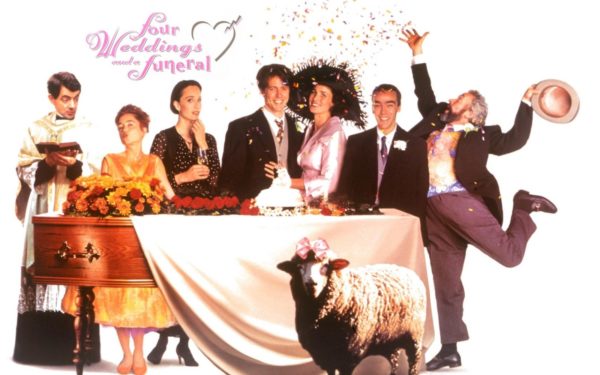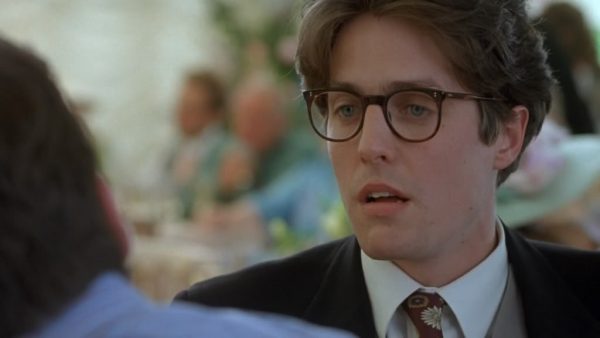Hasitha Fernando dives into the story behind Four Weddings and a Funeral as the classic British rom-com turns 30…
Is there a more quintessentially British rom-com out there than Four Weddings and a Funeral? I honestly don’t think so. The movie introduced us to a multitude of uber-talented creatives – the dashingly handsome Hugh Grant and his hilarious antics, the witty brilliance of screenwriter Richard Curtis and the assured direction of filmmaker Mike Newell – who came together amidst innumerable obstacles to give audiences something timeless and special. With its 30th anniversary just around the corner we look back at what went on, all those years ago, during the making of Four Weddings and a Funeral…
Richard Curtis’ experiences as a wedding attendee was the inspiration for the story
Richard Curtis is one of Britain’s most successfully comedy writers. The chap co-wrote the brilliant TV shows Blackadder and Mr. Bean along with comedy legend Rowan Atkinson and also penned the scripts of the lucrative romantic comedies Notting Hill (1999), Bridget Jones’s Diary (2001), Love Actually (2003) and Bridget Jones’ Diary: Edge of Reason (2004). However, it was with Four Weddings and a Funeral’s success that Curtis’ career as a movie screenwriter really kicked off.
The writer based the movie’s premise on his own experiences as a wedding attendee. According to Curtis he began writing the script at the age of 34, after realizing he had attended 65 weddings during an 11-year period. At one wedding Curtis was even propositioned by a fellow guest, but he turned her down forever regretting his hasty decision. However, this bittersweet personal experience was worked into his script, functioning as the origin of Charles and Carrie’s romance in the story.
Hugh Grant was about to quit acting when he received the script
Nowadays the name Hugh Grant is one that does not require any introduction, but things were a tad different for the up-and-coming actor prior to his breakout role in Four Weddings and a Funeral. In fact, Grant was about to quit his acting career due to a lack of opportunities when he received the script for the film. During an interview he did in 2016 Grant stated that: “I wasn’t really getting any work at all, and then to my great surprise this script came through the letterbox from my agent, and it was really good. And I rang on and said there must be a mistake, you’ve sent me a good script.” For his audition Grant played a tape of when he was best man at his brother’s wedding.
Mike Newell fought to have Hugh Grant in the lead role
Mike Newell made his feature film debut with the made-for-television-film The Man in the Iron Mask (1977). He drew critical acclaim for Bad Blood (1981) and Dance with a Stranger (1985), the latter of which garnered him the Award of the Youth at the 1985 Cannes Film Festival. Newell was also one of a handful of filmmakers handpicked by George Lucas to helm episodes of The Young Indiana Jones Chronicles. The 1976 feature-length TV drama Ready When You Are, Mr. McGill convinced Richard Curtis that Newell was the ideal guy to helm Four Weddings and a Funeral. But in a curious twist of fate when it came to the casting of Charles, it was Newell who rooted for Hugh Grant getting cast, overriding Curtis’ favorite Alan Rickman and over seventy other hopefuls before him. However, Rickman wasn’t overtly keen in the role and refused to audition. Eventually Curtis was persuaded by Newell and the producers to cast Grant and the rest, as they say, is history.
Jeanne Tripplehorn, Marisa Tomei, & Sarah Jessica Parker were in contention for the female lead
Before Andie MacDowell got cast as Carrie to star opposite Hugh Grant, a host of other talented actresses were considered for the role. In fact, Jeanne Tripplehorn (Basic Instinct) was the actress originally cast as Carrie before she dropped out of the project following a personal tragedy. The role was then offered to Marisa Tomei (The Wrestler), but she too was unavailable due to personal reasons. Sarah Jessica Parker (Sex and the City) was also reportedly in talks for the role. It was around this time that Andie MacDowell, who was in London to promote Groundhog Day, read the script and decided to audition for the role. Sure enough, the Sex, Lies and Videotape star aced the audition and ended up being cast as the vivacious Carrie.
Four Wedding and a Funeral had an insanely low-budget
The budget for Four Weddings and a Funeral was a paltry $4.4 million and the producers had to struggle hard to even wrangle that amount in the first place. This affected the release date of the movie, delaying it by a further two years or so and as an unfortunate consequence the casting process commenced as early as 1992 and dragged on until it finally got the go-ahead. Because of the minuscule budget the Scottish wedding was not filmed in Scotland and even the extras involved in the wedding scenes were asked to bring their own suits. Production too was rushed, starting on June 8, 1993, and concluding on July 14, 1994, lasting a mere 36 days due to the budgetary constraints.
The cast & crew weren’t happy with Mike Newell’s directing style
During an interview on The Howard Stern Show (1994), Hugh Grant said that he, co-executive producer and writer Richard Curtis, and many of the cast and crew of the were dissatisfied with director Mike Newell’s creative choices and his direction for the movie. In a lot of ways Grant & co. were under the impression Four Weddings and a Funeral was destined to be a flop, however, when the film became a massive hit Grant said, looking back, that one can never be too sure of what will land with audiences versus what won’t. Grant even re-appraised Newell’s directing style, adding that the filmmaker’s decision to make the humor feel more grounded instead of being lighthearted was the reason for the movie’s success, “He seemed to be giving direction against what I thought were the natural beats of the comedy. He was making a film with texture, grounding it, playing the truths rather than the gags”.
Studio executives weren’t fans of the movie’s title
Although many would agree that the title Four Weddings and a Funeral was one of the most unique film titles a rom-com could have the studio execs were of the notion that the title would turn off male viewers from watching the movie. In its place some of the alternative titles that got suggested were: “True Love and Near Misses”, “Loitering in Sacred Places”, “Rolling in the Aisles”, and “Skulking Around”. Thankfully, none of these substitute titles were seriously considered.
An initial screening tested disastrously with audiences
As hard as it may be to imagine a screening of Four Weddings and a Funeral testing poorly with audiences, that’s exactly what happened. The initial screening of a rough-cut of the movie didn’t receive the response that Mike Newell, Richard Curtis and the cast were expecting. Hugh Grant elaborated on this experience by saying, “I thought we’d screwed it up. When we went to watch a rough cut, all of us, me, Richard Curtis, Mike Newell, the producers, all thought this was the worst film that’s ever been perpetrated. We’re gonna go and emigrate to Peru when it comes out so no one can actually find us. And then they had a, a few cuts later they took it to Santa Monica for a test screening and everyone loved it. And it was a great surprise.”
The film’s U.S. distributor was “concerned” about the level of profanity in the movie
Gramercy Pictures, which handled the movie’s distribution in the North American territories, was genuinely concerned about the level of profanity and sexual content that was there in the film. Because of this the production company sent many a fax requesting the filmmaker and producers to make changes to the final product, as they believed it would be unsuitable for American distribution or subsequent television airings. The opening scene, which had Charles and Scarlet drop F-bombs left, right and center was one which Gramercy Pictures particularly objected to due to the negative response received during a screening at the conservative Salt Lake City area. Accordingly, Mike Newell and the actors agreed to reshoot the scene with the British swear word “Bugger” to be used in the American version.
An unexpected hit, box-office success, awards glory & much more
As mentioned earlier Four Weddings and a Funeral was made on a very low budget and these budgetary constraints compelled the cast and crew to come up with creative ways to curb production costs. Their efforts, however, paid off in spades when the movie went on to make a whopping $245.7 million at the worldwide box-office. In UK the film remained number one for nine consecutive weeks surpassing A Fish Called Wanda (1988) as the highest-grossing British movie to that point.
On review aggregator Rotten Tomatoes, the film continues to hold an approval rating of 92% based on 134 reviews, with the site’s critics consensus stating, “Hugh Grant ably snatches up the bouquet of leading man status with Four Weddings and a Funeral, a sparkling romantic comedy given real charm by its chummy ensemble and Richard Curtis’ sharp-witted screenplay.” Film critic Roger Ebert gave the film three-and-a-half stars out of four, calling it “delightful and sly”, and directed with “light-hearted enchantment” by Newell. He praised Grant’s performance, describing it as a kind of “endearing awkwardness”.
The unexpected financial success of the flick also contributed to clearing the past losses of both Working Title Films and Polygram Filmed Entertainment as well. Four Weddings and a Funeral went on to make the year-end lists of multiple film critics and even received two Academy Award nominations for Best Picture and Best Original Screenplay the following year. The BAFTAs bestowed the movie with multiple successes including Best Picture, Best Director, and Best Actor while the Golden Globe Awards honored Hugh Grant with Best Actor – Musical or Comedy during awards season.
Since its release the flick has been showered with praise and accolades for the impact it had on the British film industry as well as the people involved with the film. In 1999, Four Weddings and a Funeral was placed 23rd on the British Film Institute’s 100 greatest British films of the 20th century. In 2016, Empire magazine ranked it 21st in their list of the 100 best British films. A 2017 poll of 150 actors, directors, writers, producers, and critics for Time Out magazine ranked it the 74th best British film of all time. The movie was single-handedly responsible for launching the career of Hugh Grant and catapulting him into superstardom. And despite Richard Curtis’ misgivings about Grant at first, the film became the first of many successful collaborations – namely Notting Hill, Bridget Jones’s Diary and Love Actually – the pair would be involved with later on.
Four Weddings and a Funeral also featured an amazing soundtrack chockfull of popular songs, including a popular cover version of The Troggs’ “Love Is All Around” performed by Wet Wet Wet that remained at number 1 on the UK Singles Chart for fifteen weeks and was then the ninth (now twelfth) biggest selling single of all time in Britain. The Guardian, during its 20th anniversary retrospect of the film summed up the effort best by saying, “Its influence on the British film industry, on romantic-comedy writing, on the pop charts, on funeral readings, on ‘haircuts’, was enormous,” and we cannot agree with their assessment more.
Hasitha Fernando is a part-time medical practitioner and full-time cinephile. Follow him on Twitter via @DoctorCinephile for regular updates on the world of entertainment.























